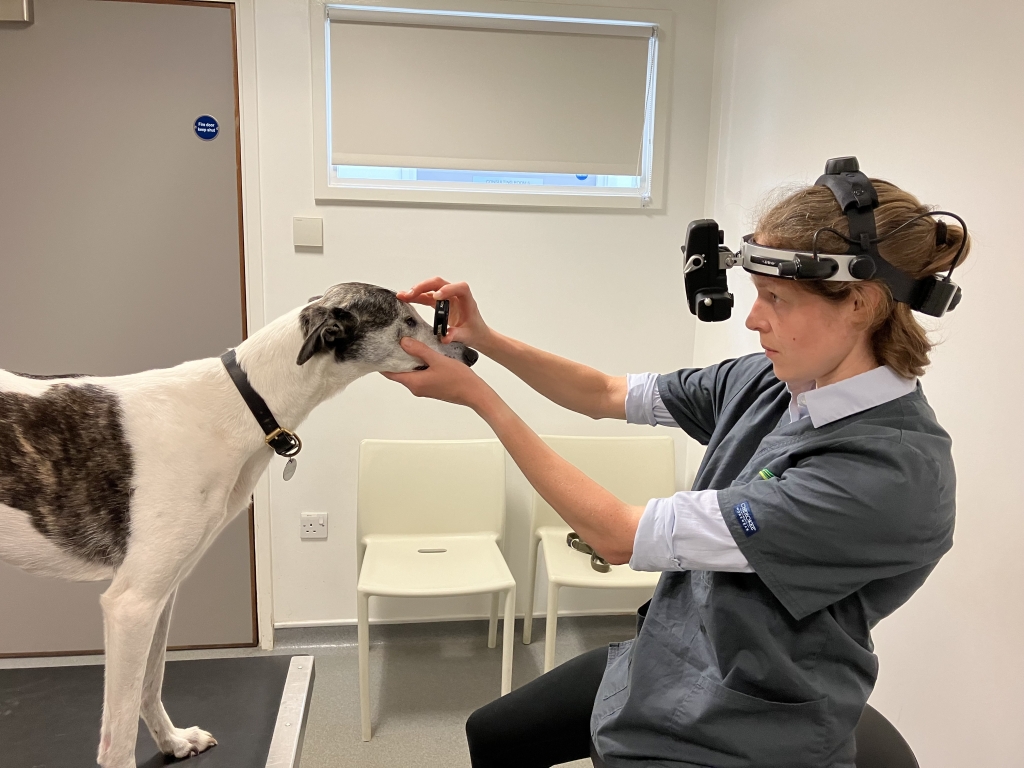
Emily Jeanes, a veterinary surgeon diplomate in ophthalmology at North Downs Specialist Referrals will lead a new screening programme to check for hereditary eye disease in dogs being used for breeding at the Surrey animal hospital.
NDSR Focus On Congenital Eye Disease In Breeding Dogs
An award-winning small animal hospital in Surrey has introduced a new screening programme to check for hereditary eye disease in dogs being used for breeding.
The service has been introduced at Linnaeus-owned North Downs Specialist Referrals, in Bletchingley, and is headed by veterinary ophthalmology expert Emily Jeanes.
Emily, a veterinary surgeon diplomate in ophthalmology and a member of the British Veterinary Association’s (BVA) eye panel, said the scheme was focused on identifying dogs with inherited eye conditions before they are used for breeding.
Emily explained: “We are working in partnership with the BVA, the Kennel Club (KC) and the International Sheep Dog Society (ISDS) to provide a screening service for dogs who are being considered for breeding.
“All eye examinations will be carried out by a specially trained, BVA recognised ophthalmologist and ideally would be completed before a dog is used for breeding.
“We also recommend that all breeders commit to regular eye exams for their dogs as the onset of eye diseases can vary between different breeds.
“In addition, dogs used for breeding should have a final check after eight years of age to ensure there is no indication of late onset inherited disease and show evidence of a clear breeding line.”
The NDSR scheme is open to all dogs and breeds, including crossbreeds and non-Kennel Club registered dogs, and will focus on checks for possible inherited eye disease.
The hospital is also providing a separate ‘Litter Screening Eye Examination’ service for puppies aged between five and 12 weeks. All puppies must be microchipped before the examination.
Emily added: “Breeds that commonly experience greater risk of eye disease include Border Collie, Cocker Spaniel, English Springer Spaniel, Golden Retriever, Labrador Retriever and Miniature Schnauzer.
“There are also many types of congenital eye diseases, which are conditions that exist from birth or soon after birth, in contrast to non-congenital conditions which develop later in life.
“Many of these conditions can have serious effects on health and welfare, causing pain, blindness, or the need for lifelong medication.
“This service allows us to help breeders who want to minimise the risk of serious ocular conditions in their breeding line and in their breed as a whole. It gives us pleasure to be able to exercise our skills to support them by alerting them to potential problems ahead.”
For more information on the scheme or to arrange an appointment, visit https://www.ndsr.co.uk/our-services/ophthalmology/screening-for-inherited-eye-disease/.
NDSR offers specialist-led services in anaesthesia and analgesia, cardiology, dentistry, dermatology, diagnostic imaging, internal medicine, neurology, oncology, ophthalmology, orthopaedics, soft tissue surgery and spinal surgery.
For more information, visit www.ndsr.co.uk or search for North Downs Specialist Referrals on social media.
More from Linnaeus Group

 1 month ago
1 month ago  344 views
344 views